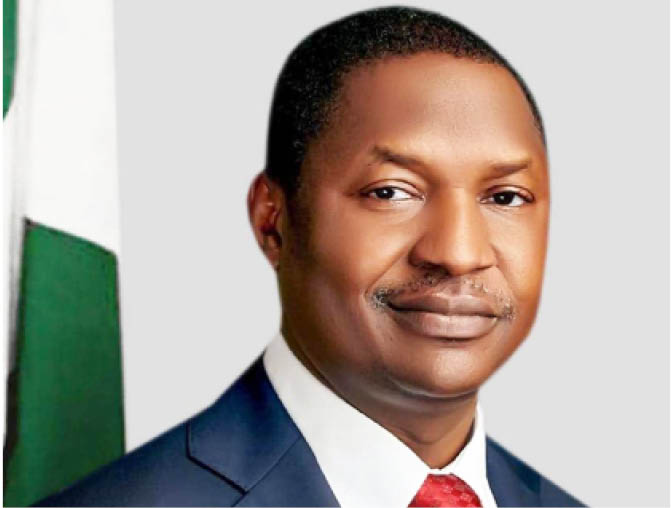Speaking just before me at the second Shinkafi Intelligence and Security Summit last July, Attorney General of the Federation (AGF) Abubakar Malami pointed that our constitutional rights do not extend to causing mayhem and urged Nigerian youth to work towards uniting our country, not destroying it. Speaking after him, I pointed out that the best teaching is by example: if leaders do not live by what they preach, then their lectures on our constitutional duties are so many empty words. I was reminded of this exchange following the actions of the AGF recently.
Sadly, he has lately been brazenly practicing the exact opposite of his preaching by choosing to elevate his personal interest above the national interest.
- Nigeria vs Ghana: CAF Doctor Dies At MKO Abiola Stadium
- Pupils sit on floor in 50% Nigerian schools – UBEC
During the unnecessary back-and-forth over the amendment of the Electoral Act, Malami is suspected of being behind Buhari’s mortifying nit-picking. After rejecting the bill five times, citing such excuses as the cost of election, insecurity, drafting errors and proximity to the date of elections, Buhari finally gave his assent. But even as he signed, he called for section 84(12) of the bill to be repealed, calling it unconstitutional.
Section 84(12) says that “No political appointee at any level shall be a voting delegate or be voted for at the Convention or Congress of any political party for the purpose of the nomination of candidates for any election”. The President argues that this amounts to discriminatory “inhibitions and restrictions” on political participation. He further muddles the waters by saying that this section contradicts a section of the constitution requiring those in public office to resign at least 30 days before an election they plan to contest, thereby interfering in law set directly by the constitution.
Buhari’s arguments are deeply flawed. Those in “public service” are civil servants, according to section 318 of the constitution, not political appointees. The civil service is characterised by rules, permanence, anonymity and neutrality; by contrast, political appointment is short-lived, public and partisan. Thus, political appointees are not covered by the 30-day rule. Since political appointees are not covered by the ‘public service’ rules of the constitution, the National Assembly had the power to legislate restrictions that may apply to them.
Thus, the National Assembly was right to reject the president’s call for them to remove section 84(12). But if Buhari believed that ‘public service’ means all those working for the government, then he should have resigned at least 30 days before the 2019 election, because our elected leaders work for the government too! Moreover, the section is not discriminatory because the same constitution that enshrined these rights also provides restrictions such as age qualification for each office. Similarly, the law forbids those in the military, the police and similar establishments from participating in politics. Is that also discriminatory?
Section 45 of the constitution provides that the National Assembly can make laws tempering with most rights, including section 40 which Buhari referenced, if they are “reasonably justifiable in a democratic society” and are in the public interest. The clause in question is in the public interest and will advance democracy by preventing political office holders and elected officials from using their governmental power to win primary elections.
Of course, the president’s legal arguments were not developed by him. He was guided, or misguided, by the AGF who has a huge personal interest in the issue. The most open secret today is that AGF Malami is planning to stand to be governor of Kebbi State in the next election. Thus, if subsection 12 were allowed to stand, he would be forced to resign six months in advance and this would seriously affect his chances of winning the ticket or indeed the election. That is why he appointed himself the head of the political vanguard that has made it its duty to take down the proviso which they see as an existential threat to their political ambitions.
When the National Assembly rejected the president’s invitation for them to repeal the subsection, the next thing we heard was a court judgement “ordering” the AGF to delete the subsection. Proceedings, if any, took place in absolute secrecy so no one knew that a suit had been filed until after judgement. The matter was filed, processes exchanged, arguments taken, judgment written and delivered in under three weeks! This has got to be the fastest court proceedings in the history of this country where the simplest of cases lingers for years. Whoever is interested in this case must be so powerful in the legal system.
Apparently to ensure the needed secrecy, the AGF alone was the respondent to the anonymous lawsuit. All other necessary parties – including the INEC, the National Assembly and political parties – were neither joined nor notified of the suit. In ramming through the suit, the judge disregarded the law that where a necessary party (someone that will be directly affected by the judgement) is not joined, the court lacks jurisdiction. And the matter went on forum shopping to Umuahia, over 350 miles from the venue of the alleged wrong, apparently to ensure that there is no chance for the Abuja media to catch wind of it. Who could it be who is so powerful, and who knows Nigeria’s legal system so well?
The plot thickened with the alacrity with which the AGF promised to implement the judgement immediately. Isn’t that curious? The same AGF has appealed against every judgement of consequence ever given against the government – and yet chose not to appeal this bizarre, and manifestly wrong, judgment. An order to “delete” a provision of a law validly passed is alien not just to Nigeria, but also to every common law country I know. The furthest the Nigerian courts can go is to make to a “declaration of incompatibility”, invalidating any action taken pursuant to the relevant law. No court in Nigeria – certainly not a trial court that has not heard from the interested parties – has the power to delete a provision of the law. This is not simply illegal, but antithetical to the doctrines of separation of power enshrined in our constitution.
Even more curious is that there was an earlier judgment barring the AGF, among other parties, from deleting the subsection, but the AGF ignored it even though ruling was issued at his home in Abuja. separately, we now know that an identical lawsuit was struck out by the Sokoto Division of the Federal High Court before it was filed in Umuahia. The two were so similar that the learned Femi Falana argued that both must have been initiated by the same person and thus the AGF was likely aware of the unfavourable ruling in Sokoto. If the AGF was aware, but failed to draw the attention of the court, then he has potentially breached the rules of the legal profession.
The AGF is, by law, the chief law officer of the Federation. By appointing him, President Buhari charged the AGF with fulfilling the president’s oath to “preserve, protect and defend the constitution”. Instead, the AGF has decided to embark on a journey to trash the constitution in open daylight. If the chief law officer contemptuously violates the law where it suits him, how would he expect other Nigerians to follow the law? If the AGF has chosen to bastardize the very system he is meant to advance, who would save the system from collapsing? If the AGF has failed to live by what he preaches, how does he expect ordinary Nigerians to take their country, or its system of laws, seriously?

 Join Daily Trust WhatsApp Community For Quick Access To News and Happenings Around You.
Join Daily Trust WhatsApp Community For Quick Access To News and Happenings Around You.

